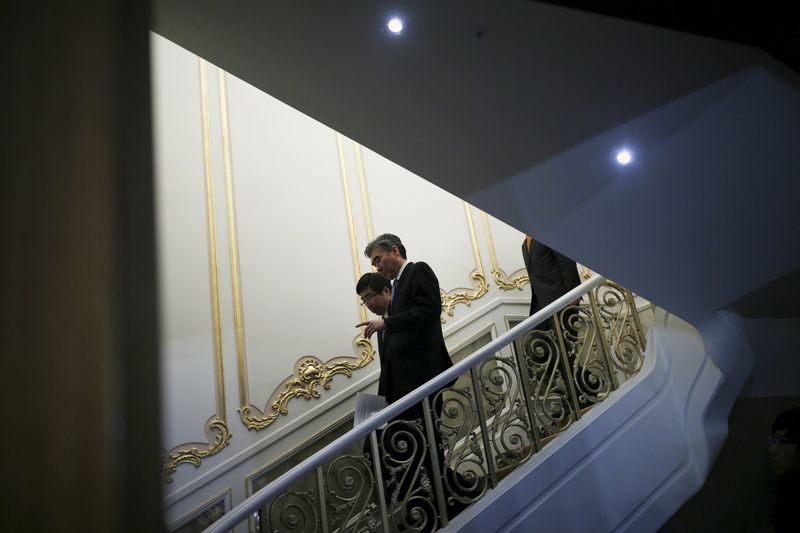By Ju-min Park and Tony Munroe
SEOUL (Reuters) - South Korea warned North Korea on Wednesday that the United States and its allies were working on sanctions to inflict "bone-numbing pain" after its latest nuclear test, and urged China to do its part to rein in its isolated neighbor.
With tension high on the border after the North's fourth nuclear test on Wednesday last week, South Korean forces fired shots toward what Yonhap News Agency said was a suspected North Korean drone.
It returned to the North after the shots, South Korean military officials told Reuters.
The North's nuclear test angered both China and the United States and again raised questions about what can be done to stop its development of nuclear weapons.
The World Economic Forum withdrew its invitation for North Korea's foreign minister to attend its annual Davos meeting because of the nuclear test. It was to have been the country's first participation in the event in 18 years.
The U.S. House of Representatives voted nearly unanimously on Tuesday to pass legislation to broaden sanctions on the North.
But apparently unperturbed by the prospect of further international isolation, North Korean leader Kim Jong Un called for an expansion of the size and power of his country's nuclear arsenal, urging the "detonation of more powerful H-bombs", the North's state media reported.
North Korea said last week it had tested a powerful hydrogen bomb but the United States and various experts doubt that, as the blast was roughly the same size as that from its previous test, of an atomic bomb, in 2013.
South Korean President Park Geun-hye said more "provocations" by the North including "cyber-terrorism" were possible and new sanctions should be tougher than previous ones. She did not give specifics.
"We are cooperating closely with the United States and allies to come up with effective sanctions that will make North Korea feel bone-numbing pain, not only at the Security Council but also bilaterally and multilaterally," she said in a speech.
Park said South Korea and China were discussing a U.N. Security Council resolution on North Korea, noting that China had stated repeatedly that it would not tolerate its nuclear program.
China is North Korea's main ally and trade partner but it opposes its bombs, while Beijing's ties with South Korea have grown closer in recent years.
"I am certain that China is very well aware if such a strong will isn't followed by necessary steps, we will not be able to stop the North's fifth and sixth nuclear tests and we cannot guarantee true peace and stability," Park said.
"I believe the Chinese government will not allow the situation on the Korean peninsula to deteriorate further."
Sung Kim, U.S. special representative for North Korea policy, met with his South Korean and Japanese counterparts in Seoul on Wednesday and said the three agreed that a "meaningful" new sanctions resolution was needed from the Security Council.
"I hope the Chinese authorities agree with us that we simply cannot take a business as usual approach to this latest provocation. We will be working very closely with them to come up with a meaningful resolution," he said.
In Washington, White House deputy national security adviser Ben Rhodes said China could and should put more pressure on North Korea.
"We understand their concern about instability on the Korean peninsula, but the fact of the matter is that the current status quo is destabilizing where you have nuclear tests," he told a news briefing.
Rhodes said it was important the United States and its allies developed capabilities to respond and referred to Sunday's U.S. B-52 bomber flight over South Korea, missile defense and military cooperation with both South Korea and Japan.
Rhodes also said that President Barack Obama chose not to mention North Korea in his State of the Union address on Tuesday as he did not want to give Kim Jong Un the attention.
"He likes attention and probably would like nothing more than the president to spend a lot of time to talk about it in the State of the Union," Rhodes said. "We didn't particularly feel compelled to give him that attention."
'FINANCIAL PRESSURE'
China rejects complaints it is not doing enough on North Korea. In Beijing, Foreign Ministry spokesman Hong Lei said China's efforts toward a denuclearised Korean peninsula would continue.
"This is in everyone's interests and is everyone's responsibility, including China and South Korea," he said.
The U.S. House sanctions measure passed by 418-2 and Senate leaders expect to consider a similar bill shortly. The House bill had been introduced in 2015 but was brought up for a vote only after North Korea's latest test.
"(The bill) uses targeted financial pressure to isolate Kim Jong Un and his top officials from the assets they maintain in foreign banks, and from the hard currency that sustains their rule," said Republican Representative Ed Royce, chairman of the House Foreign Affairs Committee and an author of the measure.
To become law, it must also pass the U.S. Senate and be signed by Obama.
The 28,500 U.S. troops in South Korea have been put on high alert as a noisy propaganda battle is played out across the heavily fortified border with the North.
South Korea, still technically at war with the North since their 1950-53 conflict ended in a truce, not a treaty, has for days been blaring propaganda through loudspeakers across the border.
South Korea's military said it had found anti-South leaflets in the Seoul area, which it suspects were dropped from North Korean hot air balloons.

South Korean financial regulators met computer security officials at 16 banks and financial institutions and urged vigilance in the face of possible cyberattacks by North Korea, although none has been detected.